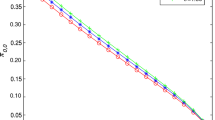Abstract
For an M/G/1 queue with the objective of minimizing the mean number of jobs in the system, the Gittins index rule is known to be optimal among the set of non-anticipating policies. We develop properties of the Gittins index. For a single-class queue it is known that when the service time distribution is of type Decreasing Hazard Rate (New Better than Used in Expectation), the Foreground–Background (First-Come-First-Served) discipline is optimal. By utilizing the Gittins index approach, we show that in fact, Foreground–Background and First-Come-First-Served are optimal if and only if the service time distribution is of type Decreasing Hazard Rate and New Better than Used in Expectation, respectively. For the multi-class case, where jobs of different classes have different service distributions, we obtain new results that characterize the optimal policy under various assumptions on the service time distributions. We also investigate distributions whose hazard rate and mean residual lifetime are not monotonic.
Similar content being viewed by others
References
Aalto, S., Ayesta, U.: On the nonoptimality of the foreground-background discipline for IMRL service times. J. Appl. Probab. 43, 523–534 (2006)
Aalto, S., Ayesta, U.: Optimal scheduling of jobs with a DHR tail in the M/G/1 queue. In: Proceedings of ValueTools 2008, Athens, Greece (2008)
Bertsimas, D., Nino-Mora, J.: Restless bandits, linear programming relaxations, and a primal-dual index heuristic. Oper. Res. 48, 80–90 (2000)
Gelenbe, E., Mitrani, I.: Analysis and Synthesis of Computer Systems. Academic Press, London (1980)
Gittins, J.C.: Multi-armed Bandit Allocation Indices. Wiley, Chichester (1989)
Kleinrock, L.: Queueing Systems, vol. 2. Wiley, New York (1976)
Klimov, G.P.: Time-sharing service systems. I. Theory Probab. Appl. 19, 532–551 (1974)
Klimov, G.P.: Time-sharing service systems. II. Theory Probab. Appl. 23, 314–321 (1978)
Lai, C.-D., Xie, M.: Stochastic Ageing and Dependence for Reliability. Springer, New York (2006)
Meilijson, I., Weiss, G.: Multiple feedback at a single server station. Stoch. Process. Appl. 5, 195–205 (1977)
Meilijson, I., Yechiali, U.: On optimal right-of-way policies at a single server station when insertion of idle times is permitted. Stoch. Process. Appl. 6, 25–32 (1977)
Osipova, N., Ayesta, U., Avrachenkov, K.E.: Optimal policy for multi-class scheduling in a single server queue. In: Proceedings of ITC-21 (2009)
Righter, R., Shanthikumar, J.G.: Scheduling multiclass single server queueing systems to stochastically maximize the number of successful departures. Probab. Eng. Inf. Sci. 3, 323–334 (1989)
Righter, R., Shanthikumar, J.G.: Extremal properties of the FIFO discipline in queueing networks. J. Appl. Probab. 29, 967–978 (1992)
Righter, R., Shanthikumar, J.G., Yamazaki, G.: On extremal service disciplines in single-stage queueing systems. J. Appl. Probab. 27, 409–416 (1990)
Schrage, L.E.: A proof of the optimality of the shortest remaining processing time discipline. Oper. Res. 16(3), 687–690 (1968)
Sevcik, K.: Scheduling for minimum total loss using service time distributions. J. ACM 21, 66–75 (1974)
Shaked, M., Shanthikumar, J.G.: Stochastic Orders. Springer, New York (2007)
Smith, D.R.: A new proof of the optimality of the shortest remaining processing time discipline. Oper. Res. 26, 197–199 (1978)
Tsitsiklis, J.N.: A short proof of the Gittins index theorem. In: IEEE CDC, pp. 389–390 (1993)
Varaiya, P., Walrand, J., Buyukkoc, C.: Extensions of the multiarmed bandit problem: the discounted case. IEEE Trans. Autom. Control 30, 426–439 (1985)
Weber, R.: On the Gittins index for multiarmed bandits. Ann. Appl. Probab. 2(4), 1024–1033 (1992)
Whittle, P.: Restless bandits: Activity allocation in a changing world. J. Appl. Probab. 25, 287–298 (1988)
Yashkov, S.F.: On feedback sharing a processor among jobs with minimal serviced length (in Russian). Tech. Sreds. Svyazi, Ser. ASU 2, 51–62 (1978)
Yashkov, S.F.: Processor sharing queues: Some progress in analysis. Queueing Syst. 2, 1–17 (1987)
Yashkov, S.F.: Mathematical problems in the theory of processor sharing queueing systems. J. Sov. Math. 58, 101–147 (1992)
Author information
Authors and Affiliations
Corresponding author
Additional information
The paper is intended for the Special Issue of Queueing Systems related to the Erlang Centennial Conference.
Rights and permissions
About this article
Cite this article
Aalto, S., Ayesta, U. & Righter, R. On the Gittins index in the M/G/1 queue. Queueing Syst 63, 437 (2009). https://doi.org/10.1007/s11134-009-9141-x
Received:
Revised:
Published:
DOI: https://doi.org/10.1007/s11134-009-9141-x




